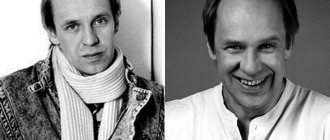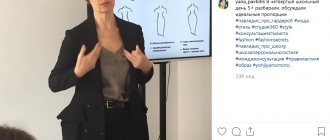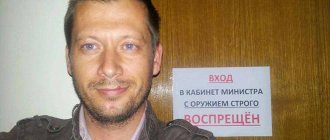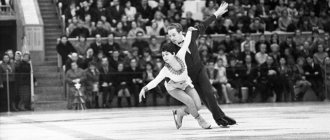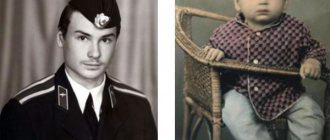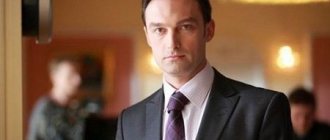Views: 625
Alexander Fatyushin has played many roles in films, but viewers primarily associate him with Sergei Gurin, the drunken hockey player from the Oscar-winning film “Moscow Doesn’t Believe in Tears.” After Alexander’s sudden death, many media outlets even began to draw parallels in the actor’s biography with his famous screen hero. But still, these analogies were largely far-fetched.
“Spring Call” 1976
Alexander Fatyushin, comes from a simple working-class family. Born in Ryazan in 1951. GITIS on his second trip, graduating from the famous institution in 1973. He became especially friends with his fellow students Igor Kostolevsky and Alexander Solovyov .
Read also How the star role of Handsome helped Alexander Solovyov after his death
Alexander Fatyushin: biography, family
The hero of this article was born in Ryazan, this happened in March 1951. Alexander Fatyushin was born into an ordinary family. The professional activities of his parents had nothing to do with the world of dramatic art. His father worked as a driver, his mother worked in a factory.
Alexander is not the only child in the family. He had an older brother and sister.
Alexander Fatyushin
Childhood
Alexander Fatyushin was born on March 29, 1951 in Ryazan into a working-class family. His father was a driver, and his mother worked in a factory. Alexander's childhood was very ordinary. Together with his parents, brother and sister, he lived in a communal apartment in the city center. In his free time, the boy enthusiastically played football and even played for the youth team of the Ryazan Almaz club.
Alexander’s love for theater was instilled in him by his older brother Vitaly, who was involved in the school drama club. Following the example of his older brother, Alexander also enrolled in a theater studio - at the Palace of Culture of Trade Unions. After graduating from school in 1968, he decided to go to Moscow to enter the theater institute. Alexander’s relatives were skeptical about Alexander’s idea, and his older sister even said: “Don’t meddle in there, it’s useless, you won’t become an actor anyway. Your surname is not an actor’s, Fatyushin.” To which he replied: “I bet that in ten years everyone will know the name Fatyushin?!” Alexander won the argument...
On his first attempt, Alexander failed to conquer Moscow; he was not accepted into any of the institutes to which he applied. But stubborn Alexander did not give up, and a year later he still entered GITIS, taking the course of Andrei Aleksandrovich Goncharov. It was an experimental set, and there was joint training between actors and directors. By the way, Goncharov took only three guys to act: Sasha Solovyov, Igor Kostolevsky and Fatyushin.
Already in his first year at GITIS, Alexander Fatyushin made his debut on stage. Goncharov entrusted the young student with a small role in the play “Maria” based on the play by A.D. Salynsky.
And after graduating from GITIS in 1973, Goncharov invited Fatyushin, Kostolevsky and Solovyov to his place - to the Moscow Theater named after V. Mayakovsky. Soon Solovyov went to the Youth Theater, and Alexander and Igor remained...
A year after graduating from GITIS, Fatyushin made his film debut. At first, he played a small role as a business traveler in Alexei Korenev’s television film “Three Days in Moscow.” And a little later (in the same 1974) in the famous, once scandalous, and now, as they say, cult film by Andrei Smirnov “Autumn”, he played the role of a young man named Edik.
Thanks to the role of Edik, Fatyushin was noticed, and in 1976 he was invited, along with Igor Kostolevsky, to play the main role in Pavel Lyubimov’s film “Spring Call”. The young actors coped with the task brilliantly. Fatyushin very convincingly played Sergeant Karpenko, who deals with recruits in training. And Kostolevsky is a young intellectual conscript.
The film was released after passing the strictest military censorship. Nevertheless, he conveyed the main idea to the viewer. Sergeant Karpenko, just yesterday the same recruit, having received power into his hands, is trying to control not only the appearance of the soldiers, but also control their destinies. However, he has to face a person who, outwardly obeying him, despises him. It is in communication with him that the provincial guy, who became a king and god for those who were sent to study for six months, learns the necessary moral lessons.
Of course, this was just another fairy tale about the army. But how talentedly Fatyushin and Kostolevsky performed their roles! The film had a warm reception from the public, and Fatyushin was awarded the prize for best actor at the All-Union Festival in Riga and a silver medal for his work. Dovzhenko.
From that moment on, Fatyushin began to act in films a lot. In 1977, he played engineer Dmitry Radkevich in Boris Stepanov’s film “I Guarantee Life,” and a year later he played criminal investigation inspector Tikhonov in Albert Mkrtchan’s detective story “A Medicine Against Fear.”
Fatyushin also had a somewhat unusual role - behind the scenes. But first things first. When starting filming the film “Office Romance,” Eldar Ryazanov wrote a large and interesting role especially for Fatyushin as the husband of secretary Verochka (she was brilliantly played by Liya Akhedzhakova). “I had to play this fanatical motorcyclist. The conflict was level - he loved her and the motorcycle, but the motorcycle was still bigger,” the actor recalled.
A lot of material had already been filmed, when suddenly an accident happened - in the theater during a performance, Fatyushin received a serious eye injury, after which he was taken to the hospital, where he underwent surgery. Ryazanov waited as long as he could for the actor, but recovery was delayed. Then he came to the hospital and honestly admitted that all the deadlines had expired. Fatyushin didn’t want the role to be put together haphazardly, and he advised that if that’s the case, then it’s better to cut it all out. As a result, during the course of the film, Verochka constantly talks to her husband, and he appears in the frame in only two tiny episodes.
This is how Alexander Fatyushin gradually approached his star role - hockey player Gurin in the legendary melodrama by Vladimir Menshov “Moscow Doesn’t Believe in Tears.” The director invited artists to audition in pairs. Fatyushin auditioned with Irina Muravyova, and their duet was approved almost immediately.
Unfortunately, many scenes were not included in the final version of the film. Officials from Goskino did their best here. Most of all, Fatyushin regretted that the final scene was cut out: “Remember, everyone gathered at the dacha, Gurin “gave up”, he says that he is moving on to coaching. The heroines sit on the porch and sing. And then Gurin was supposed to appear: his tie was on one side, his shirt was sticking out, and with him some kind of moron. I argued with Muravyova over a C, and the khanyga shouted at her: “How are you talking to him? This is Gurin, I grew as a person at his matches!” But Goskino did not miss this scene, they say, a national team player cannot get drunk like that.”
When creating his character, Fatyushin did not rely on any prototype; rather, it was a collective image of an athlete. Moreover, among the actor’s friends there were many hockey players. He was especially friendly with the famous Larionov five. After the film was released, many hockey players came up to him and thanked him: “San, you hit the nail on the head.” Such recognition was worth a lot. And soon Alexander Fatyushin was invited by the Soviet team along with a group of artists as support to the Olympic Games in Calgary.
The film “Moscow Doesn’t Believe in Tears” was a resounding success among both viewers and professionals. He collected many different awards, including: the Academy Award for Best Foreign Language Film in 1980, the Distributors Guild Award for Best Foreign Film in 1980, and the Award for Best Foreign Film at the American Film Festival in Houston-81. Fatyushin did not receive any prizes for his role; he received much more - popular recognition and the love of millions of viewers.
In the 80s, the cinematic fate was very successful. He actively acted in film, and although more often he had the opportunity to play supporting characters, he did it so vividly that he remained in the viewer’s memory on a par with the main characters. His best works were associated with the roles of strong, courageous people, such as Afanasy Krykov in the television film “Young Russia”, paratrooper Kruglov in the adventure film “Solo Voyage”, former detective Valentin Silov, who enters into confrontation with the mafia in the detective story “Code of Silence” and etc. His heroes embodied a truly Russian character, captivating with their intelligence, masculine charm and masculinity.
There is a story connected with “Young Russia” that could become fatal. On May 12, 1980, the scene of the hanging of the hero Alexander Fatyushin was filmed. The actor had to throw a rope around his neck, jump off the steps, and the carefully cut rope had to break at the right moment. The rope didn't break. Fatyushin was lucky that the knot was tied incorrectly, and he managed to stick his hand through. Efficient comrades also helped. The scar on his neck did not go away for a very long time, and the miraculously saved actor has since celebrated his second birthday every year.
If in cinema Alexander Fatyushin got bright, but still somewhat one-dimensional roles, then in the theater the work was much more varied. He played both comedic roles and so-called “social heroes”. Alexander played in the plays: “Rumor”, “Energetic People”, “The Life of Klim Samgin”, “Running”, “A Man in His Place”, “Napoleon”, “Not About Nightingales”, and many others. And the play “Children of Vanyushin,” where he played the main role, was dubbed “Children of Fatyushin” by theatergoers.
For a long time, Alexander Fatyushin remained a bachelor. True, in the early 80s he had a stormy and long-lasting romance, but it ended in nothing.
Actress Elena Molchenko, who was 12 years younger than him, played in the theater with Fatyushin. She admits that she fell in love with Alexander immediately after arriving at the theater, but he did not pay any attention to her for a long time. Elena did nothing on her part either. Everything happened suddenly...
One day, it was in 1986, they walked to the subway together and talked. This was their first long conversation. The next day they talked some more, and three days later Alexander invited Elena to go with him to the hospital where his relative was lying. She agreed. In the ward, Alexander suddenly said: “Vital, meet me, this is my bride.” Elena calmly introduced herself to him: “Lena.” After that, they went to a jewelry store and bought gold rings. For the entire theater, their wedding was a real shock, because there they always knew who was having an affair with whom, but here...
“Like this: I accidentally said “my bride,” and that’s how she became,” Alexander Fatyushin later joked. But I think this was not an accident. The couple lived together for 17 years. They lived very modestly (they didn’t even have a car) but happily.
But the Fatyushins never had children. “This is the case when God did not give,” says Elena Vasilievna. “At first we waited, then we began to deal with this issue. And all the doctors unanimously said: wonderful, good, but they are still not there. Then the time came, and we came to terms with it. Then the parental instincts and reflexes passed, we already got along..."
In the first half of the 90s, Fatyushin continued to act in films, and very actively. One after another, films with his participation were released: “Live Target”, “Cairo-2 Calls Alpha”, “Wolfhound”, “Tanks Are Walking Along Taganka”, “Code of Silence-2”, etc. However, then a crisis came in the domestic cinema. Alexander Fatyushin could not fit into the new conditions for a long time.
Elena Vasilyevna says: “When perestroika began, he really became confused and was completely disoriented. The bewilderment remained until the last day: how can this be? A person at this age is a strong professional, and it turns out that the profession is not about this, but about the fact that... you need to sell or buy correctly.”
Things were not easy for Fatyushin in the theater either. He even wrote a letter of resignation. But he couldn’t live without the theater for long, and soon returned.
As for the cinema, it was only towards the end of the 90s that several films with his participation were released. He played an FSB employee in Evgeny Matveev’s melodrama “Loving in Russian-3”, roles in Leonid Eidlin’s melodrama “With New Happiness”, the TV series “Transit for the Devil”, and the lyrical comedy “New Year in November”.
As already mentioned, Alexander Fatyushin was very fond of sports. For many years he played football in the Moscow acting team. He was also a passionate fan - he supported the Moscow Spartak, with many of whose players he maintained friendly relations. One of my closest friends was the famous goalkeeper Rinat Dasaev.
It just so happened that Alexander Fatyushin died as a fan. On that fateful day of April 6, 2003, Spartak lost heavily to CSKA. Fatyushin was worried all evening, and a few minutes after the final whistle he felt ill. When the doctors arrived, it was already too late...
Latest Best Movies
Ladies invite gentlemen
Moscow does not believe in tears
Childhood
At the age of four, Alexander Fatyushin almost died. The boy was playing too hard and didn’t see the car coming straight at him. The child was saved by a housemate, who at the last moment pulled him out from under the wheels of the car.
Alexander grew up as an ordinary child. He was a lively and active boy, fond of sports. From the first years of his life, Fatyushin's passion was football. His interest in theater arose already in his teenage years. Alexander began studying at a local theater studio and performing in amateur performances.
First steps in an acting career
During his school years, Alexander Fatyushin began attending a drama club. By the way, at first his older brother Vasily studied there, who instilled in Alexander a love of theater. He was a kind of example for his younger brother and inspired him to also become an artist. In general, this is what happened. Later, Alexander Fatyushin enrolled in the theater studio of the Palace of Culture of Trade Unions. However, over time, Vasily lost interest in the theater, but his younger brother, on the contrary, firmly decided to continue along his chosen path. After graduating from tenth grade, Sasha told his relatives that he would enter theater school. At that time, even those closest to him did not believe that he would succeed. Even his sister told him that with the surname Fatyushin he wouldn’t be allowed onto the theater’s threshold. He even bet with her that in 10 years everyone would know his last name. Alexander Fatyushin, despite the words of his sister, did not take a pseudonym, as he was proud of his parents.
The path to acting fame was thorny and difficult, but still Alexander did not give up and continued to move towards his intended goal. Soon the talented actor Alexander Konstantinovich Fatyushin became known throughout the Soviet Union, whose cause of death was truly a shock to his fans.
View gallery
Choice of profession
When Alexander Fatyushin announced to his family his intention to become an actor, no one supported him. Mother and father would prefer that their son get a “serious” profession. My sister even stated that a guy with such a surname would not be allowed even onto the threshold of a theater university. However, the stubborn young man said that soon the whole country would know about him.
After graduating from school, Fatyushin set off to conquer Moscow. The young man's first attempt to enter a theater university was unsuccessful. Alexander's lack of experience prevented him from impressing the admissions committee. The guy worked hard for a year and then tried again. He managed to become a student at GITIS.
Andrei Goncharov took the young man into his workshop. Fatyushin carried his gratitude to his mentor throughout his life. Goncharov not only revealed the secrets of the profession for him, but also helped him believe in his talent. Many future stars studied on the same course with him, for example, Alexander Solovyov, Igor Kostolevsky.
Theater
My student years flew by in an instant. Aspiring actor Alexander Fatyushin received a GITIS diploma in 1973. Soon after this, the Mayakovsky Theater opened its doors to the newcomer.
Fatyushin began with episodic roles, then he was entrusted with more serious tasks. Over the years of cooperation with the Mayakovsky Theater, he took part in many famous productions. “The Life of Klim Samgin”, “Rumour”, “Running”, “Napoleon” - just a few of them. Fatyushin’s roles in the plays “Rumor” and “The Life of Klim Samgin” were awarded the USSR State Prize.
From obscurity to fame
Actor Alexander Fatyushin has achieved some success on the theater stage. However, he still became a star thanks to cinema. The GITIS graduate first appeared on the set in 1974. Alexander made his debut in the film “Three Days in Moscow”, playing a business traveler. Then the aspiring actor appeared in the films “Autumn” and “Personal Affair”. Small roles did not bring him fame, but allowed him to gain valuable experience.
Fatyushin acquired star status after he played in the film “Spring Call”. He embodied the image of Sergeant Karpenko in this picture. Alexander was able to convincingly play yesterday’s conscript, who has seized power and seeks to control the destinies of his juniors. Igor Kostolevsky brilliantly portrayed an intellectual conscript who resists the despotism of his superiors. Kostolevsky and Fatyushin played beautifully in a duet.
Filmography
- — Three days in Moscow — business trip at the hotel
- — Autumn — Edward
- — Spring conscription — Sergeant Karpenko
- — Office romance — the husband of Vera’s secretary
(cut from the theatrical version of the film, left in one episode without words) - — I guarantee life — Mitya Radkevich
- — A woman from afar is a tank driver
- — Medicine against fear — police captain Tikhonov
- — Moscow doesn’t believe in tears — Sergei Gurin
- — A walk worthy of men — Gusev
- - Do you remember? — Victor Rumyantsev
- — Faster than your own shadow — Feodosius Nikitich, Korolev’s coach
- — Ladies invite gentlemen — Victor
- — Waiting — Igor
- - They were actors - Nikolai Andreevich Baryshev
- — Young Russia — Afanasy Krykov
- — 34th ambulance — Alexander Mukhanov
- - This guy has returned... - Volodya
- — Running start — Alatyrtsev
- — The Man at the Stop Station — Fedor Taranin
- - Kidnapping - Dad
- - Happy, Zhenya! — Valery
- — The road to yourself — Sanya
- — Come free — Sergei Mironovich Kirov
- - Law of wintering
- — Solo voyage — guard ensign Alexander Kruglov
- - This is my village - Pyotr Dyldin
- — Dancing on the roof — Boris Pletnev
- - Parachutists - doctor
- - Dear Edison! — Razuvaev
- — The victims have no complaints — Alexander Stepanov
- — Daylight saving time — Oborimov Vyacheslav Aleksandrovich
- - Life of Klim Samgin - Lyutov
- — Two banks — Stepan
- — Braking in the skies — Zhelezov, co-pilot
- — Women who are lucky — Ivan Shevardin
- — Knock on the door
- — Code of Silence — Valentin Silov
- — Cairo 2 calls Alpha — Thomas Condon
- — Living target — Goryunov
- — Charged with death
- — Wolfhound — Vova
- - Tanks are walking along Taganka - head physician, professor
- - Blood for blood - police major Andrei Sergeevich Tagantsev
- — Ticket to the Red Theater, or Death of the Grave Digger — Maslennikov
- — Code of Silence — 2 — Valentin Silov
- — The Far Side of the Moon (TV version of the film “Code of Silence”)
- — Russian novel — Lukin
- - A true artist, a true entertainer, a true killer
- — Petersburg secrets — Egor Dmitrievich Beroev
- — To love in Russian 3: Governor — Pavlenok
- - With new happiness! — Anatoly
- — New Year in November — Nikolay Vasin
- — Mechanical Suite — Police Major Lebedev
- - Hi baby!
- - My border - Major Panteleev
- - Russian Amazons - doctor
- - And in the morning they woke up - the cutter
70s movies
Thanks to the film “Spring Call,” not only viewers, but also directors paid attention to the actor. Films with Alexander Fatyushin began to be released one after another. In the film “I Guarantee Life,” he played the role of engineer Dmitry Radkevich, who died during tests of ejection systems. This man comes to life in the memories of loved ones who tell the story of his life.
In the film "Office Romance" Alexander was given a prominent role. Eldar Ryazanov planned to entrust the talented actor with the role of the husband of the secretary Verochka. However, these plans were not destined to come true; Fatyushin was seriously injured right before filming. As a result, he appeared only in an episode of the film.
What other interesting films with Alexander Fatyushin were presented to the audience in the 70s? The talented actor created a vivid image in the detective story “A Cure for Fear.” In this film he played Captain Tikhonov. His hero is an investigator who is involved in a mysterious case. The criminals are accused of using the latest medical drug to neutralize law enforcement officers.
Alexander Konstantinovich Fatyushin - biography
Alexander Fatyushin Biographies / Famous namesakes / First names / Last names / Middle names / First and middle names / Horoscopes / Tests / Events / Home
Alexander Konstantinovich Fatyushin is a Soviet and Russian theater and film actor, Honored Artist of the RSFSR. Zodiac sign - Aries.
Winner of the Award for the best performance of a male role at the All-Russian Film Festival in Riga in 1977 for the film “Spring Call”, recipient of the Silver Medal named after Alexander Dovzhenko (1977 for the film “Spring Call”), laureate of the USSR State Prize[en] in 1984 year - for theatrical work.
Fatyushin played in more than 40 films. Among the most famous films are “Young Russia”, “Solo Voyage”, “Code of Silence”, “The 34th Ambulance”. Alexander Konstantinovich never got to see his most important role, but he had a major episode in his life - in the film “Moscow Doesn’t Believe in Tears.” Many believe that the actor played himself in this film.
Alexander Fatyushin was born
March 29, 1951 in Ryazan, in a working-class family. His father was a driver[en] and his mother was a housewife. In addition to Alexander, the family had two more children: a brother born in 1940 and a sister born in 1945. The Fatyushins lived in an ordinary apartment in the city center. There was a small vegetable garden in the yard, and several chickens and a pig were kept as domestic animals. In his free time, Sasha enthusiastically played football and played for the youth team of the Ryazan club “Almaz”.
The love of theater was instilled in Alexander Fatyushin by his older brother, Vitaly, who at one time studied in the school drama club. Looking at him, the younger brother became an artist - he enrolled in the theater studio of the Palace of Culture of Trade Unions. However, later the older brother lost interest in the theater, but Alexander, on the contrary, after the tenth grade told his relatives that he was going to enter the theater institute. His sister scolded him: “What kind of artist are you with such a surname...” To which Alexander replied: “I bet that in ten years everyone will know the surname Fatyushin?!” The sister, confident that she was right, agreed, choosing as a future prize a rare thing at that time - a tape recorder.
In the summer of 1968, Alexander arrived in Moscow with the firm intention of conquering it on his first visit. I applied to all theater schools, however... I failed the exams in all of them. The sister could celebrate a small victory, but Alexander still had nine more attempts ahead. And the second of them, a year later, ended in success - Fatyushin entered GITIS, taking the course of Andrei Aleksandrovich Goncharov.
As for the artist’s personal life, for a long time he preferred to remain a bachelor. It is known that in the early 80s he had a long affair with a certain woman, for whose sake Alexander could commit truly romantic acts. For example, he could take her to the train before the performance. Then he played the performance, rushed by taxi to the airport, boarded the plane, and a few hours later Fatyushin met his beloved[en] on the station platform. But it so happened that this romance did not end with a trip to the registry office, but that happened later. Fedor Ibatovich Razzakov . Dossier on stars. Idols of all generations. - M.: ZAO Publishing House EKSMO-Press, 1999, p. 371 - 372.
Film debut
A year after graduating from GITIS, Alexander Fatyushin made his film debut. At first, he played a small role as a business traveler in Alexei Korenev’s television film “Three Days in Moscow.” And in 1974, in the famous, once scandalous and cult film by Andrei Sergeevich Smirnov “Autumn”, he played the role of a young man named Edik.
Thanks to the role of Edik, A. Fatyushin was noticed, and in 1976 he was invited, along with actor Igor Matveevich Kostolevsky, to play the main role in Pavel Lyubimov’s film “Spring Call”. The young actors coped with the task brilliantly. Fatyushin very convincingly played Sergeant Karpenko, who deals with recruits in training. And Kostolevsky is a young intellectual conscript.
Despite the fact that the film was released after going through the strictest military censorship, it conveyed the main idea to the viewer. Sergeant Karpenko, just yesterday the same recruit, having received power into his hands, is trying to control not only the appearance of the soldiers, but also control their destinies. However, he has to face a person who, outwardly obeying him, despises him. It is in communication with him that the provincial guy, who became a king and god for those who were sent to study for six months, learns the necessary moral lessons.
Of course, this was just another fairy tale about the army. But how talentedly Fatyushin and Kostolevsky performed their roles! The film had a warm reception from the public, and Fatyushin was awarded the prize for best actor at the All-Union Festival in Riga and the Dovzhenko silver medal for his work.
Role behind the scenes
From that moment on, Alexander Konstantinovich Fatyushin began to act in films a lot. In 1977, he played engineer Dmitry Radkevich in Boris Stepanov’s film “I Guarantee Life,” and a year later he played criminal investigation inspector Tikhonov in Albert Mkrtchan’s detective story “A Medicine Against Fear.”
Fatyushin also had a somewhat unusual role - behind the scenes. When starting filming the film “Office Romance,” director Eldar Aleksandrovich Ryazanov wrote a large and interesting role of the husband of Verochka’s secretary especially for Fatyushin (she was brilliantly played by actress Liya Medzhidovna Akhedzhakova). “I had to play this fanatical motorcyclist. The conflict was on the level - he loved her and the motorcycle, but the motorcycle was still bigger,” recalled Alexander.
A lot of material had already been filmed, when suddenly an accident happened - in the theater during a performance, Fatyushin received a serious eye injury[en], after which he was taken to the hospital, where he underwent surgery. Ryazanov waited as long as he could for the actor, but recovery was delayed. Then he came to the hospital and honestly admitted that all the deadlines had expired. Fatyushin didn’t want the role to be put together haphazardly, and he advised that if that’s the case, then it’s better to cut it all out. As a result, during the course of the film, Verochka constantly talks to her husband, and he appears in the frame in only two tiny episodes.
Gurin
So Alexander Fatyushin gradually approached his star role - hockey player Gurin in the legendary melodrama by Vladimir Valentinovich Menshov “Moscow Doesn’t Believe in Tears.” The director invited artists to audition in pairs. Fatyushin auditioned with actress Irina Vadimovna Muravyova, and their duet was approved almost immediately.
| From the film “Moscow Doesn’t Believe in Tears” - “Alexandra”, in ch. Cast: Alexey Batalov, Vera Alentova, Irina Muravyova |
Unfortunately, many scenes were not included in the final version of the film. Officials from Goskino did their best here. Most of all, Fatyushin regretted that the final scene was cut out: “Remember, everyone gathered at the dacha, Gurin “gave up”, he says that he is moving on to coaching. The heroines sit on the porch and sing. And then Gurin was supposed to appear: his tie was on one side, his shirt was sticking out, and with him some kind of moron. I argued with Muravyova over a C, and the khanyga shouted at her: “How are you talking to him? This is Gurin, I grew as a person at his matches!” But Goskino did not miss this scene, they say, a national team player cannot get drunk like that.”
When creating his character, Alexander Fatyushin did not rely on any prototype; rather, it was a collective image of an athlete. Moreover, among the actor’s friends there were many hockey players. He was especially friendly with the famous Larionov five. After the film was released, many hockey players came up to him and thanked him: “San, you hit the nail on the head.” Such recognition was worth a lot. And soon Fatyushin was invited by the Soviet team along with a group of artists as support to the Olympic Games in Calgary.
The film “Moscow Doesn’t Believe in Tears” was a resounding success among both viewers and professionals. He collected many different awards, including: Academy Award for Best Foreign Language Film of 1980, Distributors Guild Award for Best Foreign Film of 1980, Award for Best Foreign Film at the Houston American Film Festival-81 . A. Fatyushin did not receive any prizes for his role; he received much more - national recognition and the love of millions of viewers.
Cinema and theater 80s
In the 80s, the cinematic fate was very successful. Alexander Konstantinovich actively acted in film, and although more often he played supporting characters, he did it so vividly that he remained in the viewer’s memory on a par with the main characters. His best works were associated with the roles of strong, courageous people, such as Afanasy Krykov in the television film “Young Russia”, paratrooper Kruglov in the adventure film “Solo Voyage”, former detective Valentin Silov, who enters into confrontation with the mafia in the detective story “Code of Silence” and other. Fatyushin's heroes embodied a truly Russian character[en], captivating with their intelligence, masculine charm and masculinity.
There is a story connected with “Young Russia” that could become fatal. On May 12, 1980, the scene of the hanging of the hero Alexander Fatyushin was filmed. The actor had to throw a rope around his neck, jump off the steps, and the carefully cut rope had to break at the right moment. The rope didn't break. The actor was lucky that the knot was tied incorrectly, and he managed to stick his hand through. Efficient comrades also helped. The scar on his neck did not go away for a very long time, and the miraculously saved actor has since celebrated his second birthday every year.
If in cinema Alexander Fatyushin got bright, but still somewhat one-dimensional roles, then in the theater the work was much more varied. He played both comedic roles and so-called “social heroes”. Alexander played in the plays: “Rumor”, “Energetic People”, “The Life of Klim Samgin”, “Running”, “A Man in His Place”, “Napoleon”, “Not About Nightingales”, and many others. And the play “Children of Vanyushin,” where he played the main role, was dubbed “Children of Fatyushin” by theatergoers.
Marriage
For a long time, Alexander Fatyushin remained a bachelor. True, in the early 80s he had a stormy and long-lasting romance, but it ended in nothing.
Actress Elena Molchenko, who was 12 years younger than him, played with him in the theater. She admitted that she fell in love with Alexander immediately after coming to the theater, but he did not pay any attention to her for a long time. Elena did nothing on her part either. Everything happened suddenly...
One day, it was in 1986, they walked to the subway together and talked. This was their first long conversation. The next day they talked some more, and three days later Alexander invited Elena to go with him to the hospital where his relative was lying. She agreed. In the ward, Alexander suddenly said: “Vital, meet me, this is my bride.” Elena calmly introduced herself to him: “Lena.” After that, they went to a jewelry store and bought gold rings. For the entire theater, their wedding was a real shock, because there they always knew who was having an affair with whom, but here...
“Like this: I accidentally said “my bride,” and that’s how she became,” Alexander later joked. Maybe it wasn't an accident. The couple lived together for 17 years. They lived very happily, but modestly - they didn’t even have a car.
But the Fatyushins had no children. “This is the case when God did not give,” says Elena Vasilievna. “At first we waited, then we began to deal with this issue. And all the doctors [en] said in one voice: wonderful, good, but they are still not there. Then the time came, and we came to terms with it. Then the parental instincts and reflexes passed, we already got along..."
90s
In the first half of the 90s, Alexander Fatyushin continued to act in films, and very actively. One after another, films with his participation were released: “Live Target”, “Cairo-2 Calls Alpha”, “Wolfhound”, “Tanks Are Walking Along Taganka”, “Code of Silence-2”, etc. However, then a crisis occurred in the domestic cinema. Fatyushin could not fit into the new conditions for a long time.
Elena Vasilyevna says: “When perestroika began, he was really confused and completely disoriented. The bewilderment remained until the last day: how can this be? A person at this age is a strong professional, and it turns out that the profession is not about this, but about the fact that... you need to sell or buy correctly.”
Things were not easy for Fatyushin in the theater either. He even wrote a letter of resignation. But he couldn’t live without the theater for long, and soon returned.
As for the cinema, it was only towards the end of the 90s that several films with his participation were released. He played an FSB employee in Evgeny Semenovich Matveev’s melodrama “Loving in Russian-3”, roles in Leonid Eidlin’s melodrama “With New Happiness”, the series “Transit for the Devil”, and the lyrical comedy “New Year in November”.
Demise
Alexander Fatyushin was very fond of sports. For many years he played football in the Moscow acting team. He was also a passionate fan - he supported the Moscow Spartak, with many of whose players he maintained friendly relations. One of my closest friends was the famous goalkeeper Rinat Faizrakhmanovich Dasaev.
It just so happened that Alexander Fatyushin died as a fan. On that fateful day of April 6, 2003, Spartak lost heavily to CSKA. Fatyushin was worried all evening, and a few minutes after the final whistle he felt ill. When the doctors arrived, it was already too late... Encyclopedia of Cinema of Cyril and Methodius (CD LLC "Media-Service-2000"); Fyodor Razzakov, “So that people remember” (M. Eksmo, 2004); Irina Isaeva, “Alexander Fatyushin: the first from the second row” (“Teleglaz AiF” No. 16 (144) dated 04/15/2003 https://www.aif.ru); Leonid Gurevich, “Alexander Fatyushin: I am an actor with a non-actor’s surname” (Osnova newspaper No. 49 dated 07/07/2001)
Filmography of Alexander Fatyushin
- Autumn (1974);
- Three days in Moscow (1975);
- Spring Call (1976);
- Guaranteed Life (1977);
- The Cure for Fear (1978);
- Moscow Doesn't Believe in Tears (1979);
- A Walk Fit for Men (1979);
- Do you remember? (1979);
- Faster than Your Own Shadow (1980);
- Ladies Invite Gentlemen (1980);
- Waiting (1980);
- 34th ambulance (1981);
- This guy is back... (1981);
- They Were Actors (1981);
- Runaway (1982);
- Young Russia (1982);
- Kidnapping (1984);
- Happy, Zhenya! (1984);
- This is my village... (1985);
- Solo Sailing (1985);
- Paratroopers (1985);
- Dancing on the Roof (1985);
- Dear Edison! (1986);
- The victims have no claims (1986);
- Two Shores (1987);
- Knock on the Door (1989);
- Braking in the Sky (1989);
- Cairo 2 calls Alpha (1990);
- Code of Silence (1990);
- Live Target (1990);
- Wolfhound (1991);
- Charged with Death (1991);
- Blood for Blood (1991);
- Tanks are walking along Taganka (1991);
- Ticket to the Red Theater, or Death of the Grave Digger.
Alexander Konstantinovich Fatyushin died on April 6, 2003 in Moscow, after complications from pneumonia. He was buried on April 9 in the Alley of Memory of Outstanding Athletes and Coaches of the Vostryakovsky Cemetery, in Moscow, plot No. 131.
- See other famous people named Alexander.
- Other famous men named starting with A (and women).
- The life path of great people with surnames starting with the letter F.
- Description of the patronymic Konstantinovich (and more).
- Description of the first name and patronymic Alexander Konstantinovich.
- Description of the patronymic Alexandrovich (and more).
- Meaning and origin of the name Alexander.
- Description of male names starting with the letter A (and female ones).
- Description of a man's first name and patronymic starting with the letter A (and women's).
- 100 most common Russian surnames.
- 250 all-Russian surnames.
- 100 most common surnames in the USA[en].
- And an explanation of the letters of the name as interpreted by a Russian astrologerAstrology
(from the Greek astron - star and logos - word, doctrine) - the doctrine of the influence of celestial bodies on the earthly world and man (his temperament, character, actions and future), which was determined through visible movements on the celestial sphere and the relative position of the luminaries (constellation) at a given moment in time (see Horoscope).Astrology arose in ancient times (Babylonian temple astrology and others), and was closely connected with astral cults and astral mythology. It became widespread in the Roman Empire (the first horoscopes were at the turn of the 2nd-1st centuries BC). Christianity criticized astrology as a type of pagan fatalism. Arabic astrology, which reached significant development in the 9th-10th centuries, penetrated into Europe from the 12th century, where astrology enjoyed influence until the mid-17th century and was then supplanted with the spread of the natural science picture of the world.
A revival of interest in astrology occurred after the 1st World War; the phenomena of astrology are associated with subtle cosmic and biocosmic rhythms, etc. Since the mid-20th century, astrology has regained popularity.
Felix Kazimirovich Velichko.
Did you like the article? Like, comment, share with friends! Get +1 to Karma And leave a comment just below. |
| Follow us: |
Find something else interesting:
Have something to say, add, or noticed a mistake? Share! Someday your children[en]-grandchildren will come here and see a familiar name...
Spam, insults, bad language, SEO links, advertising, disrespectful treatment, etc. prohibited. Violators are banned
.
By clicking the “Submit” button in the comment, I agree to the processing of personal data:
Thanks for the tip Privacy Policy | Home | Connection
Second finest hour
From the biography of Alexander Fatyushin it follows that in 1979 he starred in the film “Moscow Doesn’t Believe in Tears” by Vladimir Menshov. The melodrama was an incredible success with the audience. All the actors who played prominent roles woke up famous. Fatyushin, who embodied the image of Gurin, also gained new fans.
Alexander's hero was in the past a talented and promising hockey player. In the present, this person is an unemployed alcoholic. Gurin became an alcoholic because his gentle character did not allow him to refuse people who wanted to drink with him. His sports career is a thing of the past; he is forced to do odd jobs and beg for money from his ex-wife. The hero constantly promises to improve and take the true path, but this never happens.
80s tapes
In the eighties, Alexander Konstantinovich Fatyushin continued to act in films. Films and TV series with his participation, released during this period, are listed below.
- "Faster than your own shadow."
- "Ladies invite gentlemen."
- "Ambulance 34."
- "Expectation".
- "Young Russia."
- "They were actors."
- "Running run."
- "The Man at the Stop Station"
- “Happy, Zhenka!”
- "Parachutists".
- "The road to yourself."
- “Come free.”
- "Abduction."
- "Solo sailing"
- “This is my village...”
- "Dancing on the Roof"
- “The victims have no complaints.”
- "The Life of Klim Samgin".
- "Two banks".
- "Daylight Saving Time"
- "Code of Silence".
- "Women who are lucky."
- "Braking in the skies."
Alexander Fatyushin: cause of death. Filmography
After his significant role in the film "Spring Call", he began to act in films a lot. The year 1977, for example, was marked by the role of engineer Radkevich in the film “I Guarantee Life,” and a year later he worked in the film “Medicine Against Fear,” where he played the criminal investigation inspector Tikhonov. In his filmography, Alexander Fatyushin was mainly involved in minor roles. In total, he has more than 60 film works to his credit. The most famous films are “Moscow Doesn’t Believe in Tears”, “Solo Voyage”, “Code of Silence”, “Love in Russian-3”, “34th Ambulance”, “Cure for Fear”, “Ladies Invite Gentlemen”.
In addition, we can note such films as “Running Run” (1982), “Young Russia” (1982), “Abduction” (1984), “Two Shores” (1987), “Cairo-2 Calls Alpha” (1990), “Charged with Death” (1991), “Russian Novel” (1993), “St. Petersburg Mysteries” (1994-1998), “Russian Amazons” (2002), “And in the Morning They Woke Up” (2003) and other films where he played bright characters Fatyushin Alexander Konstantinovich. The cause of death, which came as a surprise to many, claimed the life of a talented artist who could still have performed many roles in films.
In general, in the 80s his career was very successful: he took an active part in filming. Despite the fact that he mainly played supporting characters, he played them vividly and put his soul into the hero, so that they were remembered by the viewer along with the main characters. His best works were those where he played courageous and strong-willed people. For the most part, he played himself - a hard worker, a Russian good guy. In general, he got one-dimensional roles, but each of them was bright and unforgettable. For example, the paratrooper Kruglov in the film “Solo Voyage”, in the detective story “Code of Silence” - former detective Valentin Silov, who entered into a confrontation with the mafia. Russian actor Alexander Fatyushin, whose cause of death was related to a heart attack, will forever be remembered by us for his roles in films.
Difficult 90s
In the 90s, cinema was in crisis. This had a negative impact on the careers of many talented actors. Unfortunately, Fatyushin was no exception. Alexander began to receive filming offers rarely.
He nevertheless performed several prominent roles during this period. In the crime film “Charged with Death,” Fatyushin brilliantly played the sailor Krosovsky. In the action-packed film “Blood for Blood,” he embodied the image of a fighter against the underworld. In the series “Transit for the Devil” the actor played the role of Venya Snegirev.
Novels
Of course, fans are interested not only in creative achievements, but also in the personal life of Alexander Fatyushin. For ten years, the talented actor dated his colleague Irina Kalinovskaya. Alexandra's beloved was married to a theater director and did not want to leave her husband.
Fatyushin beautifully looked after Kalinovskaya. He constantly made surprises for his beloved and gave armfuls of roses. However, she never decided to become his wife. Irina was embarrassed by Alexander’s addiction to alcohol. Ultimately, this couple broke up.
At one time, rumors were popular that Fatyushin was having an affair with actress Natalya Gundareva. In reality, the colleagues were just friends.
Personal life
Alexander Fatyushin did not marry for a long time. It is known that in the early 80s he had a long affair with a certain woman, but in the end the affair did not end in anything, and the actor never reached the registry office. Afterwards it turned out that his lover was Irina Kalinovskaya.
While working in the theater, he met his future wife, Elena Molchenko, who was 12 years younger than him. This happened in 1986. After she saw him for the first time in the theater, Molchenko immediately fell in love with the actor, but he, on the contrary, did not pay attention to her for a long time. It all started unexpectedly. One day they walked together to the subway and talked for quite a long time, like never before. A few days later, Fatyushin invited her to go with him to the hospital, where his relative was lying at that time. Once in the ward, he introduced Lena to his relative as his bride. After that, they went to a jewelry store and bought rings. When the news of their wedding was heard in the theater, it came as a real shock to everyone, because the young people were not seen in the novel. After they submitted an application to the registry office, the actor moved the girl’s things to his apartment. Alexander Fatyushin recalled that “I accidentally said – my bride, and so she became her.” Although, perhaps this was not an accident at all. Elena Molchenko married a talented and famous actor. Shows how happy Alexander Fatyushin was on his wedding day, photo.
View gallery
And the cause of death, which claimed the actor’s life at the age of 52, could separate the couple only after 17 years of marriage.
Returning to the love story, it should be noted that the young people decided to get married three days later. The wedding took place on April 15. She was then 23 years old, and he was 35. At that time, they were both ready for such an important step in life as a wedding. The newlyweds staged a luxurious celebration, which attracted more than a hundred guests, and it took place in “Cosmos”. They lived together for 17 years, and only death could separate them. The passing of Alexander Fatyushin came as a surprise. The couple lived happily during these long years, but modestly and not richly. Like a bolt from the blue, the cause of death destroyed the family idyll in which Alexander Fatyushin lived. Personal life with the actor was going well for Elena, who then grieved the death of her husband.
They had no children. They waited for the baby to appear, but it never happened. After the couple was checked, the doctors said that everything was fine with them. Over time, nothing changed, and in the end they came to terms with it.
According to his wife’s recollections, the actor was temperamental: if he didn’t like something, he said everything directly and reacted very violently to everything. He was an unrestrained and shocking person.
In the evenings, they loved to turn on karaoke at home and sing; in addition, they read books, and also engaged in culinary creativity: they prepared different dishes together.
Family
Alexander managed to start a family only in 1986. He met Elena Molchenko at the Mayakovsky Theater. He stole this woman from his colleague Anatoly Lobotsky. The significant age difference did not bother the lovers; they got married. The wedding ceremony took place in April 1986. Alexander lived with Elena until the end of his life.
After Fatyushin’s death, Molchenko spoke about how jealous he was. Because of this, scandals constantly occurred in the family. However, Elena never regretted marrying Alexander. She spent about 17 happy years with the actor.
Fatyushin and Molchenko dreamed of children. They repeatedly tried to have a child and consulted doctors. Doctors could not determine the reason why Elena could not get pregnant.
A few years after Alexander's death, Elena became the wife of actor Igor Vorobyov. However, she did not change her last name and remained Fatyushina according to her passport.
Sportsmanship
Alexander loved football since childhood and once played in the Ryazan club Almaz. Later he was a member of the football team of Moscow actors. He knew many famous athletes and was friends with goalkeeper Rinat Dasaev. The football players dubbed him their talisman, because when they invited him to a match, they never lost.
There was such a case in his life: when Rinat Dasaev, by the way, who was his best friend, invited Fatyushin to his wedding, the actor, of course, agreed. But then it turned out that he would not be allowed to leave the theater that day and he would have to go on stage. Of course, he was upset about this situation, and in order to still get to the celebration, he resorted to a trick: he asked the doctor to write him a sick leave. He attended the wedding, but almost lost his job because of it. Since he was already a famous person by that time, the theater quickly found out where he really was that day and almost fired him. It should be noted that Alexander Fatyushin was an avid sports fan and fan, the cause of whose death was closely and somehow fatally connected with his hobby.
Fatyushin died as a fan. On that fateful day, CSKA played with Spartak. Throughout the game, the actor was very worried, and when he realized that the team had lost, he felt bad. When the doctors arrived, it was already too late.
View gallery
Death
What is the cause of death of Alexander Fatyushin? To begin with, it should be mentioned that the actor carried his childhood passion for football throughout his life. Alexander supported his favorite team “Spartak” with all passion. In 2003, she suffered a crushing defeat in a game with CSKA. Fatyushin took the incident very painfully.
Alexander felt unwell just a few minutes after the final. An ambulance was called for him, but the doctors who arrived could not do anything. Fatyushin had a heart attack, which led to death. The actor left this world in April 2003. A week earlier he turned 52 years old.
Where is Alexander Fatyushin buried? The grave of the man who embodied the image of the alcoholic Gurin in the film “Moscow Doesn’t Believe in Tears” is located at the Vostryakovsky cemetery. The farewell ceremony for the actor was magnificent. Shortly after his death, a special issue of the “To Be Remembered” program dedicated to Fatyushin was released.
"Moscow does not believe in tears"
His next famous film work was the role of hockey player Gurin in the legendary melodrama by Vladimir Menshov “Moscow Doesn’t Believe in Tears.” Actors were invited to auditions in pairs. The duet of Alexander Fatyushin and Irina Muravyova was approved almost immediately. The image of the athlete he played turned out to be collective.
View gallery
Many hockey players said that he played this role amazingly and hit the nail on the head. The final version of the film did not include many scenes that were not censored. For example, the final scene with Alexander Fatyushin was cut out, where his hero Gurin appears drunk and begins to argue with Muravyova - Goskino did not miss this frame. The film “Moscow Doesn’t Believe in Tears” was highly appreciated by both viewers and professionals.
Alexander Fatyushin did not receive any prizes for this role, but he received something more - the love of millions of viewers and recognition of him as a talented actor. The film itself was awarded many prizes, including an Oscar in the category “Best Foreign Film of 1980.” Thanks to this film, Soviet actor Alexander Fatyushin became very popular. The cause of death also amazed the hockey players - his friends, who could not even think that a person actively involved in sports would unexpectedly pass away in this way.
Documentary
In 2011, the documentary film “The Fatal Role of Alexander Fatyushin” was presented to the audience. As you can easily guess from the title, it is dedicated to the artist. The film talks about Fatyushin’s work on the role of Gurin in the film “Moscow Doesn’t Believe in Tears.” This role turned out to be prophetic, predicting Alexander a quick rise and a quick ending.
Fatyushin's widow Elena was involved in the creation of the picture. Interviews were also taken with people who loved Alexander and were friends with him. These are Vladimir Menshov, Igor Kostolevsky, Irina Muravyova and others.
